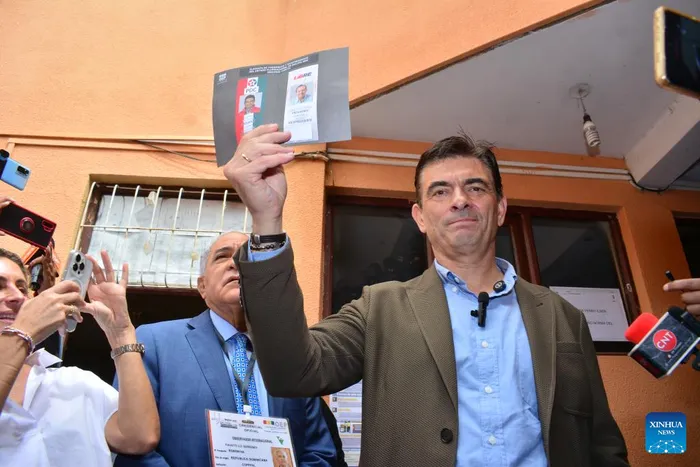BRICS+ Series: Rodrigo Paz Pereira Secures Bolivian Presidency, Marking a Rightward Shift

Rodrigo Paz Pereira shows his ballot at a polling station in Tarija, Bolivia, Oct. 19, 2025. Rodrigo Paz Pereira, 58, won the presidential runoff election in Bolivia on Sunday, according to the quick count of the Preliminary Results System of the Supreme Electoral Tribunal (TSE).
Image: XIHNUA
Centre-right candidate Rodrigo Paz Pereira has won Bolivia's presidential runoff, ending nearly two decades of leftist rule and signalling a potential recalibration of the country's international alliances, including its relationship with the BRICS bloc.
In a significant political realignment, centre-right senator Rodrigo Paz Pereira was elected as Bolivia's next president on Sunday. This victory concludes a 20-year dominance by the leftist Movimiento al Socialismo (Mas) party and marks the nation's first presidential runoff.
With over 97% of ballots in the preliminary count processed, Paz Pereira secured 54.6% of the vote, defeating rightwing former president Jorge "Tuto" Quiroga, who garnered 45.4%. The official results are expected within a week.
In his victory speech, Paz Pereira emphasised a pragmatic, non-ideological approach. "Ideology doesn’t put food on the table. What does is the right to work, strong institutions, legal security, and respect for private property," he told supporters in La Paz. He also signalled a desire for closer ties with the United States, specifically mentioning his hope to "build a close relationship" with the administration of Donald Trump to address Bolivia's chronic shortages of hydrocarbons.
The election was historic as it was the first since 2005 without a candidate from the Mas party on the ballot. The party, deeply unpopular due to a severe economic crisis and internal feuding between former president Evo Morales and outgoing leader Luis Arce, suffered a catastrophic collapse, winning just over 3% in the first round.
Paz Pereira, who campaigned on a platform of "popular capitalism" and anti-corruption, faces the challenge of a fragmented Congress where his Christian Democratic Party lacks a majority. A key factor in his success was his running mate, former police captain Edman "Capt" Lara, a viral anti-corruption figure who has positioned himself as a watchdog over the new administration.
What This Means for Bolivia's BRICS Proximity
The election of Rodrigo Paz Pereira is poised to significantly alter Bolivia's foreign policy and its relationship with the BRICS alliance, likely creating distance.
- A Pivot Towards the West: Paz Pereira's explicit statement about building a "close relationship" with the US government of Donald Trump indicates a clear strategic pivot. This contrasts sharply with the foreign policy of the Mas party, which was characterised by strong alliances with other leftist governments in Latin America and close ties with BRICS members like China and Russia. A pro-US alignment inherently creates friction with the anti-Western stance that often unites the BRICS bloc.
- Shift in Economic Ideology: The new administration's focus on "popular capitalism," private property, and attracting foreign investment aligns more closely with Western economic models than with the state-centric, resource-nationalist approach favoured by BRICS partners. This ideological shift will make Bolivia a less natural political and economic partner for the core BRICS nations.
- Re-evaluation of Partnerships: While Bolivia under Luis Arce was an enthusiastic participant in Chinese-led infrastructure and investment initiatives, a Paz Pereira government is likely to re-evaluate these partnerships. His campaign highlighted fighting corruption and ensuring "legal security," which may lead to stricter scrutiny of existing contracts with BRICS-country state-owned enterprises.
In conclusion, Paz Pereira's victory signals a fundamental reorientation of Bolivian geopolitics. The country is set to move away from the orbit of BRICS and other left-aligned blocs, instead seeking closer integration with Western economies and the United States. This will have profound implications for trade, investment, and diplomatic cooperation in the region.
Written By:
*Dr Iqbal Survé
Past chairman of the BRICS Business Council and co-chairman of the BRICS Media Forum and the BRNN
*Cole Jackson
Lead Associate at BRICS+ Consulting Group
Chinese & South American Specialist
** MORE ARTICLES ON OUR WEBSITE https://bricscg.com/
** Follow https://x.com/brics_daily on X/Twitter for daily BRICS+ updates
Related Topics: